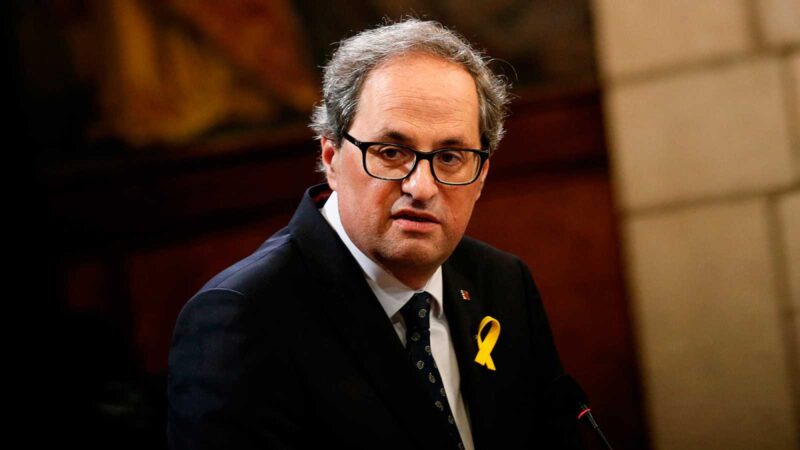On September 28th, a Spanish Supreme Court ruling removed Catalonian regional President Quim Torra from holding any public office for 18 months, renewing public attention on the issue of Catalonian independence and the underlying concerns for the country’s democracy and judicial nonpartisanship.
The ruling upholds an earlier decision made by a lower court charging Torra with civil disobedience after he ignored orders from the Spanish electoral commission to remove separatist symbols from a government building during the campaign period leading up to the general elections in the Spring of 2019. The symbols at the centre of the dispute were yellow ribbons and a banner saying “freedom for political prisoners and exiles,” expressing solidarity with Catalan leaders who were imprisoned or fled the country after a failed attempt at secession in 2017.
Prosecutors said the instructions to remove partisan symbols from government buildings were to ensure the neutrality of the election. Torra had delayed in removing the symbols for three days, arguing in court that he was defending the higher cause of political and human rights to freedom of expression. After appealing to the country’s highest court, a panel of five judges unanimously ordered his immediate removal from office, leaving Catalan deputy Pere Aragonès to take his place as interim President until the next regional election, slated to be held in February of next year.
The decision has been met with polarized reactions, mostly falling into party lines.
Several politicians expressed support for the ruling. “Public spaces belong to everybody and a political leader cannot violate the laws to flood them with separatist propaganda,” wrote Ciudadanos party leader Inés Arrimadas on Twitter. “Justice has been done.”
Torra himself called the ruling “an attempt to overthrow the government of Catalonia,” and pledged to take his case to the European Court of Human Rights.
Catalan ombudsman, Rafael Ribó, wrote in a statement that he agreed on the importance of guaranteeing a neutral federal election and had recommended Torra remove the separatist symbols; however, “the ban from holding public office of a democratically elected President for delaying the execution of the Central Electoral Board’s mandate by three days is, however, completely disproportionate and therefore contrary to the basic principles of criminal law… The restriction of such a fundamental right as the right to be elected in competitive elections can only be understood in cases of the most serious crimes.”
Torra is the third consecutive Catalan leader to be driven out of office by the federal government for separatist politics.
Monday’s ruling came just days before the third anniversary of the Catalonian referendum on independence that launched the country into a political crisis in 2017. The referendum and subsequent declaration of independence were declared illegal by the Spanish government and led to the arrest and sentencing of 12 separatist leaders to 9 to 13 years in prison for charges of sedition and misuse of public funds.
Catalonia’s President at the time, Carles Puigdemont, fled to Belgium in self-exile to avoid arrest and spent the next two years fighting Spanish attempts to extradite him until his warrant was dropped in July 2018.
In 2017, Puigdemont’s predecessor, Artur Mas, who governed Catalonia from 2010 to 2016, was also banned from holding office for two years after being found guilty for disobeying a Spanish court after holding a non-binding independence vote in 2014.
The political independence of Spain’s judiciary has been under scrutiny in recent years. The country ranked fourth-lowest of all EU countries for the perception of judicial independence by the general public in the EU Justice Scoreboard of 2019.
A letter signed by 25 Members of European Parliament urged the European Parliament, Commission and Council to recognize a problem with rule of law in Spain: “With all three last Presidents of Catalonia (…) having faced judicial prosecution for their political activity in the last five years, we have the growing conviction that in the current state of affairs, no Catalan pro-independence politician can have a fair trial in Spain.”
The Catalonian independence movement—which has deep historical and cultural roots, as well as economic motivations—has largely become an issue of the democratic right to self-determination for many supporters.


